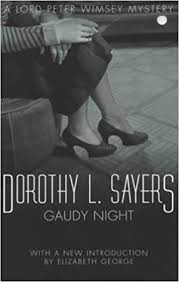I Read Books: Gaudy Night
Gaudy Night
Harriet Vane, detective novelist who we last saw on this blog being saved from the gallows and proposed to by Lord Peter Wimsey, is called in to her (fictional) Oxford women’s college to try and solve a problem. Someone is sending malicious messages (Poison Pen) and vandalising property (Poltergeist) and they hope she can find the culprit without incurring MAXIMUM SCANDAL. So it’s a low-stakes mystery.
Except is it really? It’s 1935 and women’s education is not considered a settled matter. Several – many – characters believe that a woman’s place is in the home. Tensions in Europe are part of the backstory (bringing Lord Peter in and out the plot as required) and more than once the Nazi idea of women being concerned with kinder, küche and kirche – children, kitchen, church – is spoken of approvingly, or argued against firmly. Poison Pen strikes at the heart of this and as we are aware, this is a skirmish in a non-trivial conflict.
And this conflict is a personal one as well. Is Harriet right to reject Lord Peter, though she fails (refuses) to put him off finally and totally? Should she instead concentrate on her job (or jobs; novelist, amateur detective, assistant to a scholar and researcher in Le Fanu (her (true) cover story for being in Oxford)). Can she, perhaps, have love and do her job?
This though is not even the main attraction of the novel to me. Rather it’s Harriet’s own journey, going back to an Oxford that has changed in the ten years since she studied there, meeting and making friends and acquaintances, and rivals. Seeing the college and university anew, and the (mostly) frivolous struggles of the undergraduates, that occasionally break out into serious and adult events and decisions. She goes back and on a journey and works out her place in the world, and what she should be doing.
And it’s great fun.
Read This: For Sayers’ masterwork, a detective novel that is also a university novel, that also has political and social edge that is also (sigh) a love story.
Don’t Read This: If a slightly old-fashioned view of social and educational theories is going to turn you off.
Harriet Vane, detective novelist who we last saw on this blog being saved from the gallows and proposed to by Lord Peter Wimsey, is called in to her (fictional) Oxford women’s college to try and solve a problem. Someone is sending malicious messages (Poison Pen) and vandalising property (Poltergeist) and they hope she can find the culprit without incurring MAXIMUM SCANDAL. So it’s a low-stakes mystery.
Except is it really? It’s 1935 and women’s education is not considered a settled matter. Several – many – characters believe that a woman’s place is in the home. Tensions in Europe are part of the backstory (bringing Lord Peter in and out the plot as required) and more than once the Nazi idea of women being concerned with kinder, küche and kirche – children, kitchen, church – is spoken of approvingly, or argued against firmly. Poison Pen strikes at the heart of this and as we are aware, this is a skirmish in a non-trivial conflict.
And this conflict is a personal one as well. Is Harriet right to reject Lord Peter, though she fails (refuses) to put him off finally and totally? Should she instead concentrate on her job (or jobs; novelist, amateur detective, assistant to a scholar and researcher in Le Fanu (her (true) cover story for being in Oxford)). Can she, perhaps, have love and do her job?
This though is not even the main attraction of the novel to me. Rather it’s Harriet’s own journey, going back to an Oxford that has changed in the ten years since she studied there, meeting and making friends and acquaintances, and rivals. Seeing the college and university anew, and the (mostly) frivolous struggles of the undergraduates, that occasionally break out into serious and adult events and decisions. She goes back and on a journey and works out her place in the world, and what she should be doing.
And it’s great fun.
Read This: For Sayers’ masterwork, a detective novel that is also a university novel, that also has political and social edge that is also (sigh) a love story.
Don’t Read This: If a slightly old-fashioned view of social and educational theories is going to turn you off.


Comments